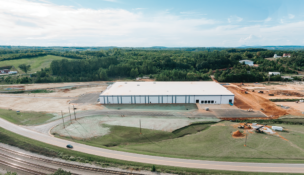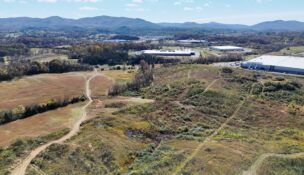Cyclical patterns
Volvo Group’s New River Valley employment ebbs and flows
Tim Thornton //March 1, 2020//
Cyclical patterns
Volvo Group’s New River Valley employment ebbs and flows
Tim Thornton //March 1, 2020//
Last June, Volvo Group announced plans to invest nearly $400 million, add 350,000 square feet to its Dublin complex in Pulaski County — already the largest Volvo truck plant in the world — and hire 777 new workers over the next six years. Five months after that announcement, though, Volvo said it would lay off 700 workers, starting in January.
“We regret having to take this action, but we operate in a cyclical market, and after two years of extremely high volumes, we have to adapt to reduced market demand,” John Mies, Volvo’s senior vice president of corporate communications, said in a November email.
Pulaski County Administrator Jonathan Sweet compares the rise and fall of Volvo’s employment to the stock market. “It ebbs and flows, ebbs and flows, ebbs and flows,” he says, “but if you look at the straight-line trend, it’s on an increase.”
In late January, there was another incline, when Volvo Group’s Mack Trucks company announced it would hire 250 people later this year for a new medium-duty truck assembly plant in Roanoke County, in the former LSC Communications book plant, which closed in 2017. Mack Trucks plans to invest $13 million in the project, according to the governor’s office.
With the layoffs, Sweet says, “They just shed the additional workers they need for that peak volume they experience due to cyclicalities.”
Matt Blondino, president of United Auto Workers’ Local 2069 in Dublin, says Volvo workers expect layoffs. “We’ve all been through it here. I mean, I’ve been through three myself,” he says. “It’s just something everyone knows when you come to work here.”
It’s the plant’s two-tiered wage system that bothers workers, according to Blondino. New hires start at $16.77 an hour, he says. Wages top out at $26.77 — except for anyone hired after 2006. Their raises stop at $21. The benefit packages are different, too.
Volvo will receive up to $16.5 million in state-funded economic development incentives over 10 years if the company adds 777 jobs to the 3,219 already in the plant when expansion negotiations began in 2018. After the January layoffs, Blondino says, that will mean adding nearly 1,500 jobs.
Franky Marchand, vice president and general manager of the Dublin plant, says, “It’s going to take us a few years to get there, but we see the potential, and that’s part of the fun of our business.”
The physical expansion will be quick. One new building is already finished. A second building should be outfitted by summer. The expansion will enable the plant to build more trucks, help it to prepare to build electric trucks and allow Volvo to bring more of its truck manufacturing process in-house. As of late January the company had not said which suppliers will be displaced. However, Marchand says Volvo will still depend on other companies to provide parts for its trucks, even though the plant temporarily laid off about 3,000 workers in October 2019 because of a UAW strike at the Mack Trucks plant that supplies Dublin with engines and transmissions.
“Manufacturing is about doing things very well,” Marchand says. “It’s not about doing everything. Nobody is good enough to do everything.”
Flexibility, such as having more than a dozen union workers qualified to operate heavy machinery helping to prepare the building site for the current expansion, works to everyone’s advantage, Marchand says.
“Some companies look at a union contract as a very dogmatic, legal way of managing a relationship,” he adds. “In reality, all of that is just a framework that defines the minimum of our relationship. … You can do things if you’ve got people with skills, as long as you agree to work for the overall benefit for everybody.”
Blondino has a different take. “It’s not a framework,” he says. “We just want them to follow the contract. That’s why we have a contract.”
Marchand realizes his plant’s importance to the local economy. “If I were in a big town, I would be one of many,” he says. “Now, here, we are a big industrial tool, a financial engine for the community. Everyone understands the good of Volvo is the good of our employees and is the good of our community. Once you’ve got that alignment, I think it’s good in general. I’m proud of it.”
Sweet, the county administrator, agrees.
“They are a vital part of our business community and larger community. They are the county’s largest taxpayer, the largest employer,” he says. “We’re super proud of Volvo. We don’t know what we would do without Volvo in our community. Who would step up and fill those big shoes?”


















